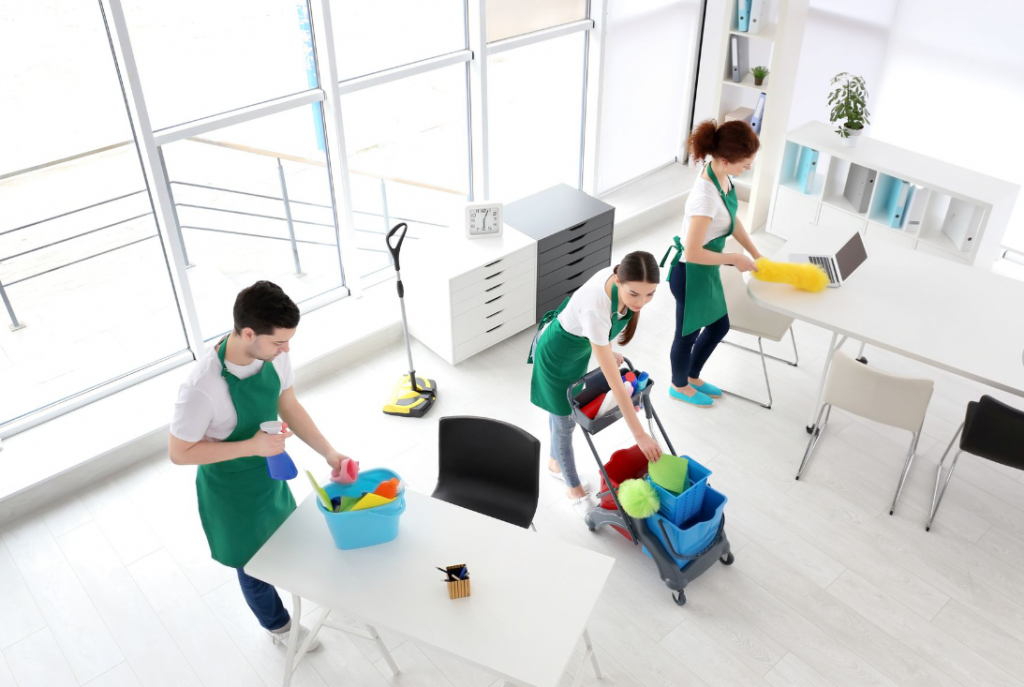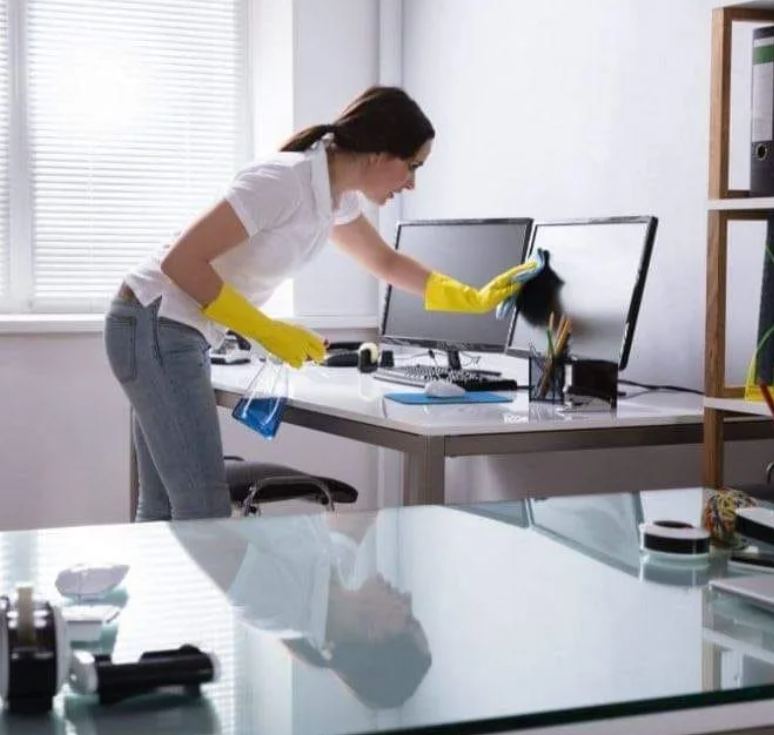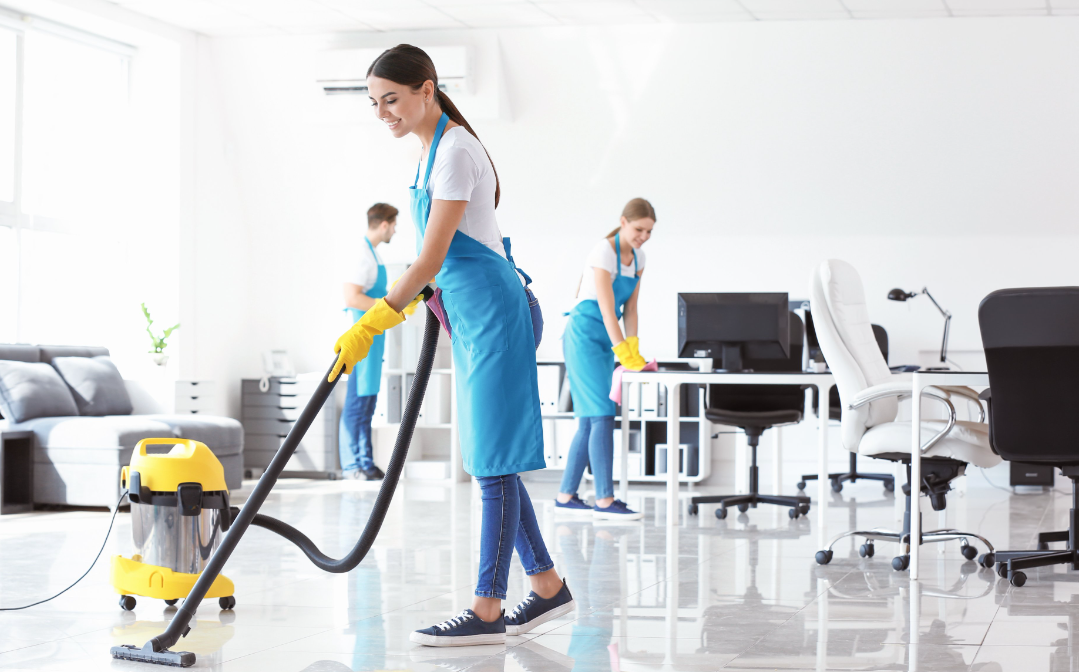Maintaining a clean and hygienic office is crucial for employee health and productivity. With so many people working in a single space, it’s essential to keep surfaces, equipment, and spaces free of harmful germs and bacteria. Here are some hygiene standards to consider for office cleaning.
- Frequently touched surfaces like doorknobs, light switches, and keyboards should be disinfected regularly to prevent the spread of germs. Proper disinfection can kill harmful bacteria and viruses that may cause illnesses.
- Ensuring that the office has enough trash cans and that they are emptied regularly will help prevent the buildup of bacteria and odors. Proper waste management is vital in preventing air pollution and maintaining a clean, fresh-smelling environment.
- Proper ventilation is essential to maintaining indoor air quality and preventing the buildup of harmful particles and allergens. Good air circulation can also help eliminate bad odors and create a pleasant workspace for employees.
- Encouraging employees to practice good hygiene, such as washing their hands frequently and covering their coughs, can help prevent the spread of illness. Educating them on the importance of proper hygiene can also create a responsible, health-conscious workforce.
- Professional cleaners have the expertise and equipment needed to thoroughly clean an office space and ensure it is free of harmful germs and bacteria. They can provide a deep clean of various surfaces, carpets, and air ducts that regular cleaning cannot achieve.
Regular Disinfection

Regular disinfection is crucial in maintaining a clean and hygienic office environment. Frequent disinfection of frequently touched surfaces such as doorknobs, light switches, keyboards, and other high-touchpoints is necessary to prevent the spread of harmful germs and bacteria.
Disinfection should be done using appropriate disinfectants and techniques that comply with established hygiene standards. Proper cleaning techniques will not only remove visible grime and dirt from commonly used surfaces but will also eliminate hidden pathogens.
Employing the services of professional cleaners is advisable as they have the necessary experience and equipment required to ensure surfaces are properly disinfected regularly. Having employees participate in maintaining cleanliness by wiping down surfaces after use is also an excellent way of preventing infections in the office.
- Regularly disinfect doorknobs, light switches, keyboards, and other commonly used surfaces.
- Use appropriate disinfectants and established hygiene standards.
- Employ professional cleaners to ensure proper disinfection of surfaces.
- Encourage employees to participate in maintaining cleanliness.
Proper Waste Management
Proper waste management is crucial for maintaining a clean and hygienic office environment. Having sufficient trash cans placed in strategic locations throughout the office can encourage employees to properly dispose of waste and prevent it from accumulating in workspaces. It is important to empty the trash cans regularly to prevent the buildup of bacteria and unpleasant odors.
In addition to having enough trash cans, separating recyclable materials from regular waste can help reduce the amount of waste sent to landfills and promote environmental sustainability. Implementing recycling bins in the office also helps keep the space organized and free from clutter.
Proper waste management can also include providing designated areas for sensitive materials, such as confidential documents or hazardous waste, to ensure they are disposed of properly. By prioritizing waste management in the office, employees can work in a clean and healthy environment, ultimately boosting productivity and overall well-being.
Implement Recycling
Recycling is an important step in maintaining a hygienic office environment. Proper waste management not only helps the environment but can also reduce the spread of contaminants. Recycling bins should be placed in common areas like the break room and labeled clearly so that employees know what materials can and cannot be recycled.
- Paper, cardboard, aluminum cans, and plastic bottles are common items that should be recycled.
- Be sure to coordinate with the cleaning staff to ensure that the recyclable materials are collected and disposed of properly.
Implementing a recycling program can also be cost-effective in the long term by reducing the amount of trash that needs to be disposed of through costly waste removal services. By separating recyclable materials from regular waste, you are not only reducing your office’s environmental impact but also helping to maintain a cleaner and healthier workspace.
Adequate Ventilation
Adequate ventilation is crucial for maintaining a healthy and productive work environment. Poor air circulation can lead to the buildup of harmful particles and allergens, which can cause respiratory problems and other health issues. Proper ventilation ensures that indoor air quality is maintained at a safe and healthy level.
One way to ensure adequate ventilation is to open windows and doors, if possible, to allow for fresh air to circulate. Additionally, the use of air purifiers and ventilation systems can help remove harmful particles and allergens from the air. It is also important to regularly maintain and replace air filters to ensure they are functioning properly and not contributing to indoor air pollution.
- Open windows and doors for fresh air circulation
- Use air purifiers and ventilation systems
- Regularly maintain and replace air filters for proper function
Maintain Air Filters
Air filters play a vital role in maintaining the quality of indoor air. Over time, filters accumulate dust, pollen, and other pollutants, obstructing airflow and reducing air quality. Regular replacement of air filters is necessary to ensure they function correctly and prevent the buildup of harmful particles and allergens in the air.
The frequency of air filter replacement varies depending on the type of filter and the usage of the space it is installed in. It is recommended to replace filters every 3 months, although heavily used spaces may require more frequent replacement. Keeping track of filter replacement schedules is crucial in maintaining the air quality of the office space.
- Maintain a cleaning schedule for the air filters.
- Choose high-quality air filters that can effectively trap pollutants.
- Train office staff on air filter maintenance and replacement.
By following these simple steps, office spaces can maintain healthy indoor air quality and prevent pollutants from spreading.
Encourage Healthy Habits

Encouraging healthy habits among employees is an effective way to prevent the spread of illness in the workplace. One simple habit that can significantly lower the risk of infection is frequent hand washing. Place alcohol-based hand sanitizers in common areas, such as bathrooms and break rooms, as an easy way to promote clean hands.
In addition, covering coughs and sneezes is another essential habit for maintaining good hygiene in the office. Remind employees to use tissues when coughing or sneezing and dispose of them properly. If a tissue is not available, instruct employees to use their elbow or sleeve to cover their mouth and nose.
Furthermore, avoiding close contact with individuals who are sick is essential to maintaining good health in the office. Encourage employees to stay at home when feeling unwell, especially if they have a fever or symptoms of respiratory illness.
Lastly, providing employee education on the best ways to prevent the spread of illness is crucial. Consider holding health and hygiene workshops, creating informational posters, and regularly communicating office hygiene policies to improve the overall health of the workplace.
Provide Hand Sanitizer
Hand sanitizer is a quick and convenient solution for maintaining hand hygiene in the workplace. Placing hand sanitizer dispensers in common areas like bathrooms and the break room encourages employees to keep their hands clean and prevent the spread of germs. It’s important to choose a hand sanitizer that contains at least 60% alcohol to effectively kill germs and bacteria.
Consider placing hand sanitizer dispensers near door handles and commonly touched surfaces to remind employees to sanitize their hands frequently. It’s also a good idea to provide individual hand sanitizer bottles to each employee for personal use. This can be done by creating a hygiene kit for each employee that includes essentials like hand sanitizer, tissues, and disinfecting wipes. By providing easy access to hand sanitizer, you can help maintain a clean and healthy workplace.
Hire Professional Cleaners
Hiring professional cleaners for office cleaning is a wise investment that can save time, money, and promote the overall health and productivity of employees. Professional cleaners have the necessary expertise and equipment to ensure that the office space is thoroughly cleaned and free of harmful germs and bacteria.
Moreover, professional cleaners use eco-friendly cleaning agents that are safe for humans and the environment, unlike regular cleaning agents that contain harmful chemicals. They can also create a customized cleaning plan that meets the specific needs of your office space and follows industry hygiene standards.
When you hire professional cleaners, you are making a commitment to ensuring a clean and healthy workplace environment for yourself, employees, and visitors. This investment can result in significant long-term benefits, such as reducing employee sick days, improving morale, and enhancing overall productivity.








